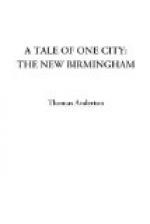When Mr. Bright was offered a seat in Mr. Gladstone’s administration in the year 1868 it caused him some severe searching of heart. He did not like giving up his freedom in the House of Commons. When this question was before him he was staying with Mr.——now Sir John Jaffray, Bart., and in discussing the matter with his host he walked up and down the room talking and talking till the hours flew by and it became late. Mr. Jaffray—who was rather an early man—became weary before Mr. Bright had finished his talk. The latter probably perceived this, for with a fine touch of humour he made for the chandelier, and said, “I see, Jaffray, that you will never go to bed till I turn off the gas.”
In searching the files of memory it is rather surprising to find how one thought leads to another, and the long-hidden past reveals itself with almost as much clearness as the events of yesterday. When I began to write down these personal recollections I thought I should find little or nothing to tell. As I proceed, however, occurrences of past years crop up and crowd upon memory, and that to such an extent that it becomes a question of what I shall not write rather than what I shall.
Lest, however, I become tiresome and tedious I will for the most part “let the dead past bury its dead,” and content myself with a little chapter of history which is especially interesting to me, and may not be without some amount of interest to others, especially those concerned in our educational and industrial progress.
One important change that has recently taken place in what I will call business Birmingham has brought back to my mind a throng of mixed memories. I allude to the vicissitudes that have taken place in local trading concerns, and I may especially mention the disestablishment or dismemberment of the manufactory of R.W. Winfield and Co., Cambridge Street. To see the break-up of this once large, important, and successful concern has been a matter of some sorrow to me. And why? Because it was at this establishment that I began my working career. Yes, at an early age I was a junior clerk at Cambridge Street Works, when it was the private business of the late Mr. R.W. Winfield.
At that time the manufactory was one of the largest if not the largest in Birmingham. It employed about 1,000 hands, and its operations were carried on in several separate departments. These were the tube and metal, the gas-fitting, the metallic bedstead, the stamped brassfoundry, the general brassfoundry, and other departments and divisions. To my youthful eyes it seemed to be a huge place, and, indeed, it was a big manufactory, and had a very extensive home and foreign trade.
I do not propose now to go into details concerning the manufacturing work done at Cambridge Street at the period of which I speak. This would be a matter of small interest to general readers. The once large establishment has had its day and has now ceased to be, though why it should have fallen to pieces so completely is not readily to be explained.




